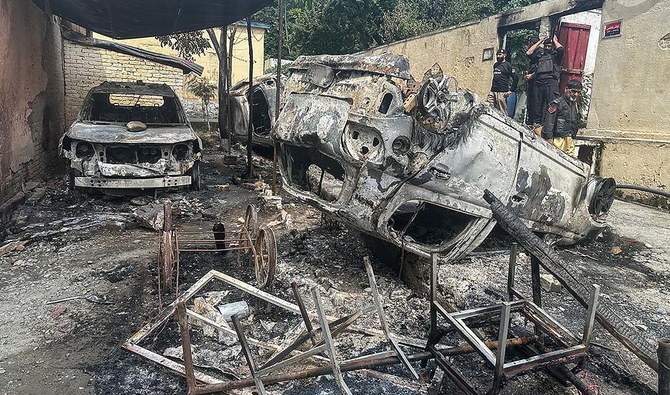PESHAWAR: At least 23 out of 49 suspects identified in the case of the lynching of a man over suspected blasphemy earlier this week have been arrested, police said on Sunday, as the provincial government of the northwestern Khyber Pakhtunkhwa province set up a special investigation team to probe the incident of mob violence.
A local tourist belonging to Pakistan’s Sialkot city was dragged from a police station by a mob in the northwestern Swat district on Thursday before being killed and set on fire over accusations he had burnt pages of the Qur’an.
“23 suspects have been arrested in connection with the lynching case,” District Police Officer (DPO) Dr. Zahid Khan told Arab News. “A total of 49 identified and 2,000-2,500 unknown suspects have been nominated in the first information [police] report.”
Khan confirmed that a joint investigation team had been formed by the Khyber Pakhtunkhwa administration with members from the counter-terrorism, information technology and special branch departments.
Police teams were continuing raids to arrest remaining suspects, the DPO said, and authorities were using modern technology like facial recognition to identify people involved in the incident, videos of which were widely circulated on social media.
Suspects in the case have been nominated under several Pakistani laws dealing with premeditated murder, rioting, unlawful assembly, being armed with deadly weapons and obstructing public servants in the discharge of public functions, among other charges.
Lynchings are not uncommon in Pakistan where the mere accusation of blasphemy can lead to mob violence.
Last month, a Christian man in his seventies was attacked by a mob on charges of burning pages of the Qur’an. He later died of his injuries in hospital.
In 2021, a Sri Lankan factory manager was lynched in one of the highest-profile incidents in the country. Six people were sentenced to death for their part in the lynching after the incident sparked a global outcry.
Human rights groups say Pakistan’s blasphemy laws are often misused to persecute minorities or even against Muslims to settle personal rivalries.


















